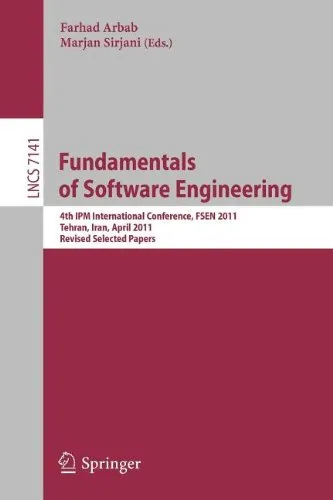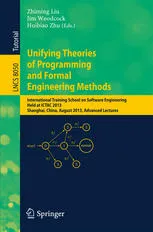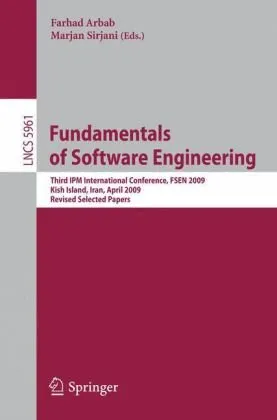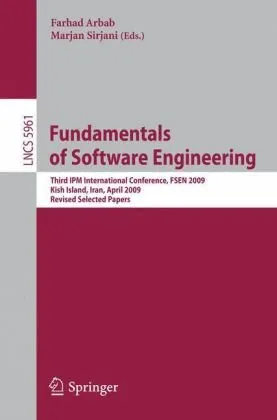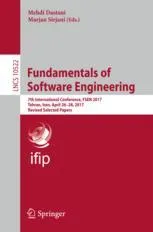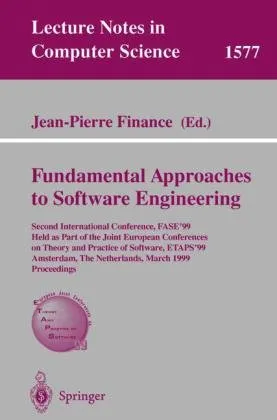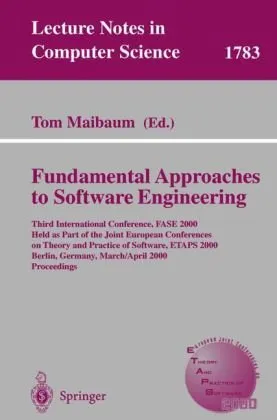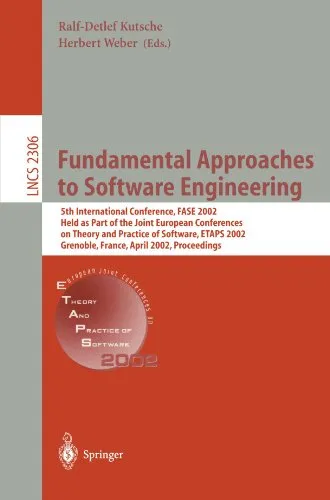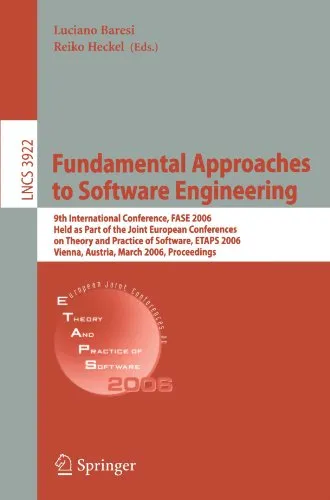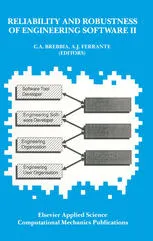Fundamentals of Software Engineering: 4th IPM International Conference, FSEN 2011, Tehran, Iran, April 20-22, 2011, Revised Selected Papers
4.0
بر اساس نظر کاربران

شما میتونید سوالاتتون در باره کتاب رو از هوش مصنوعیش بعد از ورود بپرسید
هر دانلود یا پرسش از هوش مصنوعی 2 امتیاز لازم دارد، برای بدست آوردن امتیاز رایگان، به صفحه ی راهنمای امتیازات سر بزنید و یک سری کار ارزشمند انجام بدینکتاب های مرتبط:
مقدمهای بر کتاب "Fundamentals of Software Engineering: 4th IPM International Conference, FSEN 2011"
کتاب "Fundamentals of Software Engineering: 4th IPM International Conference, FSEN 2011" مجموعه مقالاتی برجسته و علمی در حوزه مهندسی نرمافزار است که در چهارمین کنفرانس بینالمللی IPM درباره مهندسی نرمافزار (FSEN 2011) ارائه شدهاند. این کنفرانس که از ۲۰ تا ۲۲ آوریل ۲۰۱۱ در تهران، ایران برگزار شد، فرصتی کمنظیر برای تبادل دانش میان پژوهشگران و متخصصین این حوزه فراهم آورد. این اثر، که توسط ویراستاران Farhad Arbab و Marjan Sirjani گردآوری و ویرایش شده، از میان برترین مقالات ارائهشده در کنفرانس انتخاب و بازبینی شدهاند.
این کتاب به بررسی مبانی نظری و کاربردی مهندسی نرمافزار به همراه آخرین دستاوردها و پژوهشها میپردازد. مباحثی مانند Formal Methods، Model Checking، Software Verification، Coordination Models، و دیگر موضوعات تخصصی مهندسی نرمافزار در این کتاب بهطور جامع بررسی شده است. هدف اصلی این مجموعه، ارائه منابع تخصصی برای دانشمندان کامپیوتر، محققان، دانشجویان دکتری و همچنین فعالان حوزه صنعت نرمافزار است.
خلاصهای دقیق از کتاب
این کتاب، که از چندین فصل و مقالهی تخصصی تشکیل شده، موضوعاتی کلیدی در مهندسی نرمافزار را پوشش میدهد. مباحث ابتدا با یک نگاه کلی به Formal Methods آغاز میشود و سپس به موضوعاتی نظیر Model Checking، Specification Languages، و Semantics پرداخته میشود. هر مقاله ارائهشده دارای ساختاری استاندارد است که به همراه دادههای تجربی و تحلیلهای دقیق، خواننده را به درکی کامل از موضوع هدایت میکند.
همچنین در این مجموعه مقالات، چالشهای پیش روی صنعت نرمافزار و راهکارهای پیشنهادی بر اساس متدهای Formal Analysis بهخوبی تحلیل شده است. ویراستاران با انتخاب مقالات از متخصصین شناختهشده جهانی، کیفیت بالایی در محتوا تضمین کردهاند. این کتاب مجموعهای مهم برای کسانی است که به دنبال فهم عمیقتر از طراحی و تحلیل سیستمهای نرمافزاری هستند.
نکات کلیدی از کتاب
- بررسی رویکردهای Formal برای تحلیل و طراحی سیستمهای پیچیده نرمافزاری.
- ارائه نوآوریهای جدید در مباحثی همچون Model Checking و ابزارهای مرتبط.
- تحلیل روشهای اثبات رسمی برای Verification و Validation در نرمافزار.
- مطالعات موردی از تجارب موفق در بهکارگیری Formal Methods در صنعت.
- ارائه سطوح مختلف تجزیه و تحلیل از مفاهیم نظری تا مسائل کاربردی.
نقل قولهای مشهور از کتاب
"A robust understanding of software formalism is not merely academic; it is essential for creating reliable and scalable systems."
"Coordination Models are the backbone of distributed systems, enabling seamless interactions among diverse components."
چرا این کتاب مهم است؟
مهندسی نرمافزار یکی از حوزههای پایه و پرچالش در علوم کامپیوتر است که با پیشرفت تکنولوژی، اهمیت آن روزبهروز بیشتر میشود. این کتاب با تمرکز بر Formal Methods و سایر موضوعات اساسی، نیازهای پژوهشگران و متخصصین را در درک، توسعه و بهبود سیستمهای پیچیده نرمافزاری رفع میکند. همچنین، به دلیل ساختار دقیق و تحلیل عملی، این کتاب توانسته بهعنوان مرجع معتبر در جامعه مهندسی نرمافزار شناخته شود.
انتخاب و بازبینی مقالات توسط ویراستاران برجستهای همچون Farhad Arbab و Marjan Sirjani، گواهی بر کیفیت بالای این اثر است. اهمیت این کتاب نه تنها در مباحث نظری بلکه در کاربردهای عملی آن در طراحی سیستمهای نرمافزاری و انعکاس دستاوردهای صنعت محسوس است.
Introduction
The book "Fundamentals of Software Engineering: 4th IPM International Conference, FSEN 2011, Tehran, Iran, April 20-22, 2011, Revised Selected Papers" is a comprehensive collection of thought-provoking and pioneering works presented at the FSEN 2011 conference. This book captures the nuanced discussions and findings of researchers and practitioners in the domain of software engineering. By blending theoretical analyses with practical applications, the book serves as an invaluable resource for academics, students, and professionals eager to deepen their understanding of the dynamic landscape of software engineering.
The International Conference on Fundamentals of Software Engineering (FSEN) convenes leading experts to address the challenges and advancements in software engineering. The fourth edition, held in 2011, was no exception, featuring groundbreaking research aimed at bridging the theoretical and applied aspects of this field. This post-conference proceedings volume includes carefully selected and peer-reviewed papers, with topics ranging from formal verification to model-driven development, ensuring sustained academic and practical relevance.
Detailed Summary
Spanning multiple topics in software engineering, the book showcases innovative contributions to areas like formal methods, design paradigms, and tools for software verification. The selected papers reflect a wide variety of approaches, techniques, and theories that collectively shape the future of software development. Key subjects discussed include:
- The advancement of formal methods in verifying software systems.
- Model-driven development as an efficient design strategy.
- The role of graph transformations and their applications in algorithm design.
- Analysis of concurrent and distributed systems for ensuring reliability.
- Novel approaches for improving security and trust in software processes.
What makes this book particularly valuable is its dedication to addressing the challenges of real-world software engineering problems. By offering a mix of theoretical underpinnings and applied solutions, it ensures its enduring relevance to both academia and industry. Each paper is accompanied by a detailed analysis of its contributions, methodologies, and implications for future work, fostering a deeper appreciation of the complexities in the field.
Key Takeaways
The book offers several important lessons and insights into modern software engineering, including:
- Formal methods significantly enhance the reliability and correctness of software systems.
- Modeling techniques play a vital role in bridging the gap between theory and implementation.
- Verification and validation methodologies are essential for robust software design.
- Concurrency and distribution require sophisticated tools for ensuring process synchronization and fault tolerance.
- Emerging challenges in software security demand continuous innovation.
Overall, the book emphasizes the importance of integrating theoretical and applied knowledge to foster innovation and address the evolving challenges in software engineering. It also highlights how collaboration across academic and professional boundaries is crucial for achieving lasting success in this field.
Famous Quotes from the Book
"Software engineering is not a solitary endeavor; it is a confluence of theory, application, and collaboration."
"Formal verification is not merely a technique; it is the cornerstone of building trustworthy systems."
"In tackling the challenges of concurrent systems, one must embrace complexity with rigor and precision."
These quotes embody the essence of the book—emphasizing the importance of rigor, innovation, and synthesis in modern software engineering practices.
Why This Book Matters
Software engineering is evolving rapidly, and the need for rigorous exploration of both foundational theories and practical implementations has never been greater. This book fulfills that need by serving as a bridge between foundational research and its real-world applications. The carefully curated papers not only provide theoretical insights but also delve into their impact on practical software development challenges.
One of the most compelling attributes of this book is its interdisciplinary focus, bringing together experts from various domains of software engineering. This convergence fosters forward-thinking strategies for addressing technical challenges such as scalability, security, and system reliability.
Furthermore, the book underscores the relevance of formal methods in modern engineering workflows, reminding readers of their importance in building reliable, error-free software. It also stresses the significance of methodologies like model-driven engineering and graph transformations in managing complex systems.
By documenting the proceedings of FSEN 2011, the book serves as a guidepost for researchers and practitioners aiming to stay at the forefront of the field. It is not merely a collection of technical papers but a vibrant testament to the transformative power of collaboration, innovation, and academic rigor in shaping the future of software engineering.
دانلود رایگان مستقیم
شما میتونید سوالاتتون در باره کتاب رو از هوش مصنوعیش بعد از ورود بپرسید
دسترسی به کتابها از طریق پلتفرمهای قانونی و کتابخانههای عمومی نه تنها از حقوق نویسندگان و ناشران حمایت میکند، بلکه به پایداری فرهنگ کتابخوانی نیز کمک میرساند. پیش از دانلود، لحظهای به بررسی این گزینهها فکر کنید.
این کتاب رو در پلتفرم های دیگه ببینید
WorldCat به شما کمک میکنه تا کتاب ها رو در کتابخانه های سراسر دنیا پیدا کنید
امتیازها، نظرات تخصصی و صحبت ها درباره کتاب را در Goodreads ببینید
کتابهای کمیاب یا دست دوم را در AbeBooks پیدا کنید و بخرید
1169
بازدید4.0
امتیاز0
نظر98%
رضایتنظرات:
4.0
بر اساس 0 نظر کاربران
Questions & Answers
Ask questions about this book or help others by answering
No questions yet. Be the first to ask!
